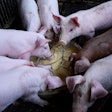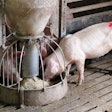The National Chicken Council urged members of Congress to revise the Renewable Fuels Standard to ensure food and animal feed producers do not see a shortage in corn supply resulting from an increasing demand in the ethanol industry.
NCC President Mike Brown testified to the Energy and Environmental Subcommittee of House Committee on Science, Space and Technology that the Renewable Fuels Standard should be subject to an adjustment when market conditions and corn harvests are such that market needs cannot be met at reasonable costs. Brown said NCC supports a proposed legislation that would allow individual states to opt out of the corn ethanol portion of the Renewable Fuels Standard.
“Allowing states to make this critical call is a step toward taxpayers and consumers better deciding for themselves what is in their best interest,” Brown said. “The policies and rules of the games for corn-based ethanol must be re-balanced and the playing field must be leveled to permit chicken producers and other animal agriculture producers to more fairly compete for the very limited supplies of corn this year and most likely for the next few years.”
Brown praised the 283 members of the House who voted in June to stop the U.S. Department of Agriculture from allocating funds for ethanol “infrastructure” and the 73 members of the Senate who voted to immediately end to the Volumetric Ethanol Excise Tax Credit, which helps support the ethanol industry.
“Compromise means that the ethanol industry needs to allow for a good measure of flexibility in the ethanol policy and program going forward. Dressing-up ethanol policy in another dress is not a compromise,” he said.
Brown also voiced dismay at the decision by the U.S. Environmental Protection Agency to legalize the sale of gasoline with as much as 15% ethanol content. Ethanol levels in gasoline are currently limited to 10%, with the exception of a high-level blend of 85% ethanol and 15% gasoline sold at a few service stations. He called for a study by the National Academy of Sciences to asses the consequences of EPA’s decision to allow use of these mid-level ethanol blends.
“Chicken companies and all of animal agriculture are bearing the burden and feeling the disastrous effects of competing for corn on a field that is heavily tilted toward the ethanol industry,” Brown said. “NCC urges this Committee and others in Congress to move quickly to approve the draft legislation for an impartial, science-based study.”













